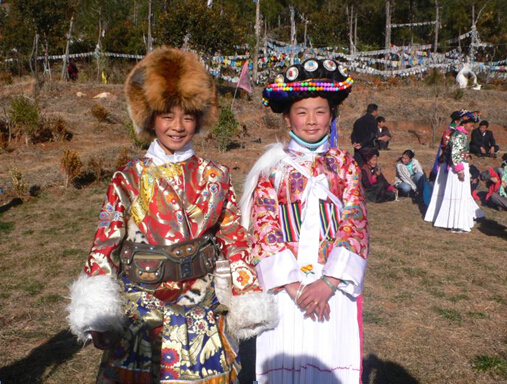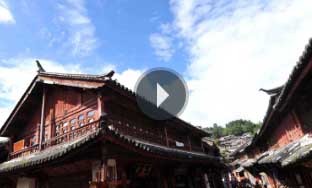Lijiang characteristics
(chinadaily.com.cn)
 |
| A girl reads a book in a tea room in Lijiang. |
 |
| Art works in a bar. |
Yang Zemin was once a flute player in a Naxi ancient music band that performed in several music videos related to Lijiang. Now he focuses on studying and playing bamboo musical instruments, such as vertical bamboo flutes.
Although he plays traditional musical instruments, Yang is still quite "modern". For example, he speaks fluent English and is familiar with Western music. Perhaps that is because he is deeply influenced by his teacher Xuan Ke, a legend in Lijiang, who has called for the rejuvenation of Naxi ancient music.
When he was 13 years old, Yang Zemin learned how to play the flute from Xuan. He has performed with his teacher in foreign countries. Afterwards, when there are foreign visitors in Lijiang, Yang will be responsible for receiving them.
He is strongly against "imitation" in the music field. He believes that every musical instrument has its own characteristics. When playing instruments, people should choose the pieces that fit the instruments’ characteristics. For example, one shouldn't play happy musical pieces on the erhu because the sound of an erhu always makes people sad.
Yang firmly holds that musicians should experience life wholeheartedly to understand music deeply. Emotions and feelings cannot be separated from music.
 |
| A man enjoys the easy life in Lijiang. |
Most of people living in Lijiang are of Naxi ethnicity. They grew up in an environment full of music, literature and nature. That explains the Lijiang people's love for art. In their spare time, they like to gather in bars to discuss music. You can easily meet with singers on the streets in Lijiang.
For the local people, their love for art has nothing to do with tourism. Art is just an essential element in their life. When visitors come to Lijiang, they immediately find themselves surrounded by a creative environment.
Art can help people meet each other more easily. Tourists can join the local people to dance around a campfire on the first day they arrive in Lijiang.
 |
| A street in the Old Town of Lijiang |
The Yulong Snow Mountains often appear in Lijian's art work. For Lijiang people, the Yulong Snow Mountains are not only holy, but also represent their wishes for eternal love.
Naxi people are extremely loyal to their love. They would rather die for love than marry someone they don't love. Legend says that there is a Third Kingdom in the Yulong Snow Mountains. People who died for love will go there to live a happy life.
Contrary to their loyalty to love, Lijiang people are almost indifferent to politics. They just care that the ruler respects their tradition and culture. For Lijiang people, there are some things more important in life, namely their tradition, their love and their art.





